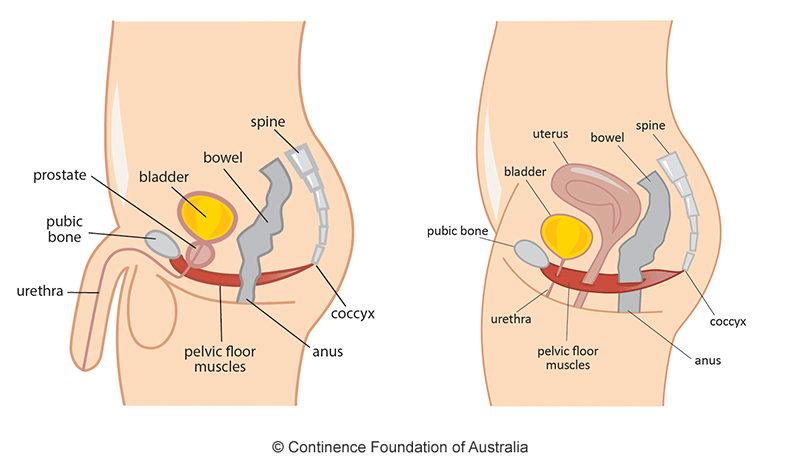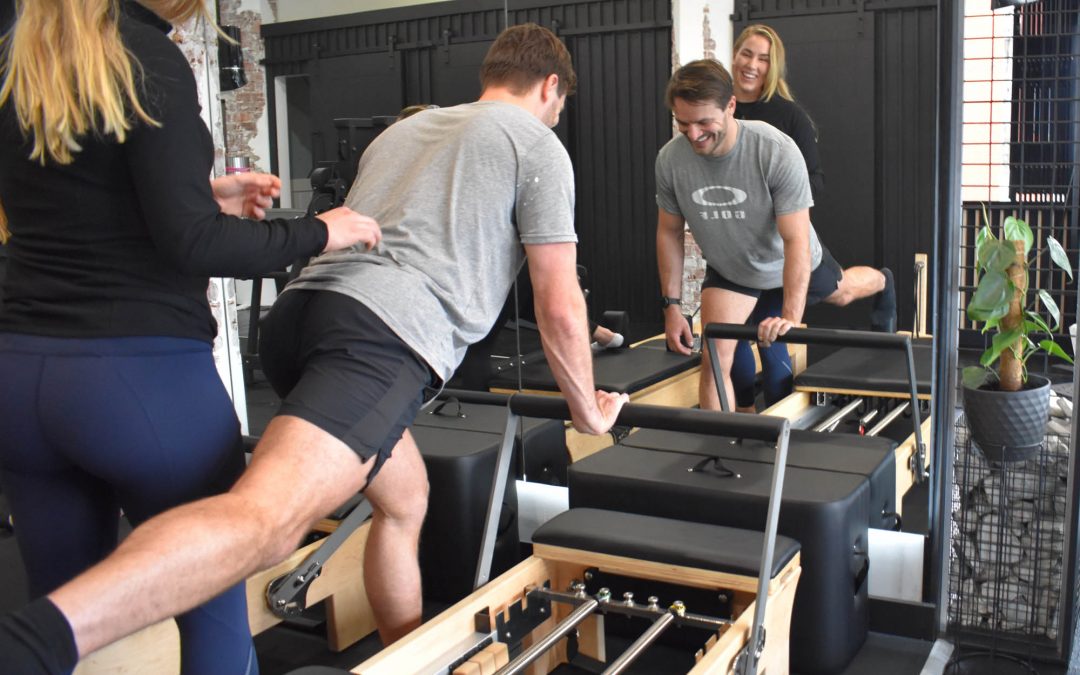Pelvic floor health is often considered as a women’s health issue; however, men do suffer from pelvic floor weaknesses and pain.
It is considered a stigma when men have complaints of stress incontinence or pelvic pain. To review, men’s pelvic floor is very similar to a women’s pelvic floor. The differences are that men have a prostate and women have a uterus. However, the components of the pelvic floor are similar in function as shown below.

Pelvic Floor Image by Continence Foundation of Australia
The function of the pelvic floor is to:
- Keeping the bladder and bowel from coming out at the wrong time
- Allow the bladder and bowel to function at the right time
- Helping your genitals get aroused during sexual activity and can improve orgasmic function
- Supporting your internal organs to keep them from sliding down.
Causes of pelvic floor weakness/pain
- Normal age-related changes
- Excessive exercise
- Stress
- Constipation
- Overweight
- Chronic coughing
- Tight pelvic floor muscles
- Post-Prostate Surgery
What can physiotherapists do for men’s pelvic floor weakness and/or pain?
A physiotherapist can assess, diagnose and treat pelvic floor weakness and/or pain on the client’s history and several objective assessments. Physiotherapists can offer several advice and education to help men with pelvic floor weakness/pain.
Why is it important for men to participate in pelvic floor exercises?
The pelvic floor, similar to muscles that you can see, are important and need to remain strong, stable, and relaxed. Thus, it is important to normalise pelvic floor exercises and educate the benefits of doing pelvic floor exercises.
Additionally, recent findings reported that a “prehab” program for those undergoing prostate surgery has been found to be beneficial in reducing long-term incontinence. Those who have their prostate removed often have a short-term temporary loss of control of urine flow. For most men, this gradually improves. However, in some men post-prostate surgery, long-term incontinence is the main problem.
Men report that leaking of urine usually occurs in upright postures, especially in activities such as sit to stand and walking. Therefore, if men are able to train their pelvic floor muscles even before getting a prostate surgery, then post-surgery patients will be far more equipped with dealing with incontinence.
What are some exercises that can be done for pelvic floor?
- Kegels: This involves learning to activate your pelvic floor muscles
How to turn on your pelvic floor muscles
- Can be done in a position that is comfortable
- There are multiple prompts/images that can help in activating the pelvic floor muscles. One is imagining you are stopping the flow of your urine, another is imagining shortening your penis and lastly walking into icy cold water and it has reached the level of your testicles where you will now imagine drawing your testicles up slightly.
- Any of these prompts/images can be used to activate the pelvic floor. It depends on what is easiest for you to imagine to activate the pelvic floor muscles.
- Stretching: stretch and allowing the pelvic floor muscles to relax and stretch can help with the strengthening of the pelvic floor muscles
- Meditation/mindfulness exercises: meditation can help muscles relax and reduce any tightening of the pelvic floor
It is recommended to do pelvic floor exercises daily, even incorporating in daily activities.
—

Tran Nguyen
Tran Nguyen graduated from the University of Melbourne with a Doctor of Physiotherapy qualification. With a background and undergraduate in sports science, Tran has extensive knowledge in sports and musculoskeletal conditions. In her spare time, she enjoys powerlifting and exploring Melbourne.
Primal Physiotherapy is the leader in Physiotherapy focused on guiding you through your injury so you can return back to life, work, and exercise pain-free. To learn more about us you can learn more here: https://primalphysiotherapy.com.au/
Primal Physiotherapy Braybrook
10/227 Ballarat Rd
Braybrook VIC 3019
(03) 9995 8044
https://primalphysiotherapy.com.au/braybrook
Primal Physiotherapy Taylors Hill
127 Gourlay Rd
Taylors Hill VIC 3037
(03) 8315 7182
https://primalphysiotherapy.com.au/taylors-hill
Primal Physiotherapy Camberwell
782 Burke Rd
Camberwell VIC 3124
(03) 9973 3090
https://primalphysiotherapy.com.au/camberwell

